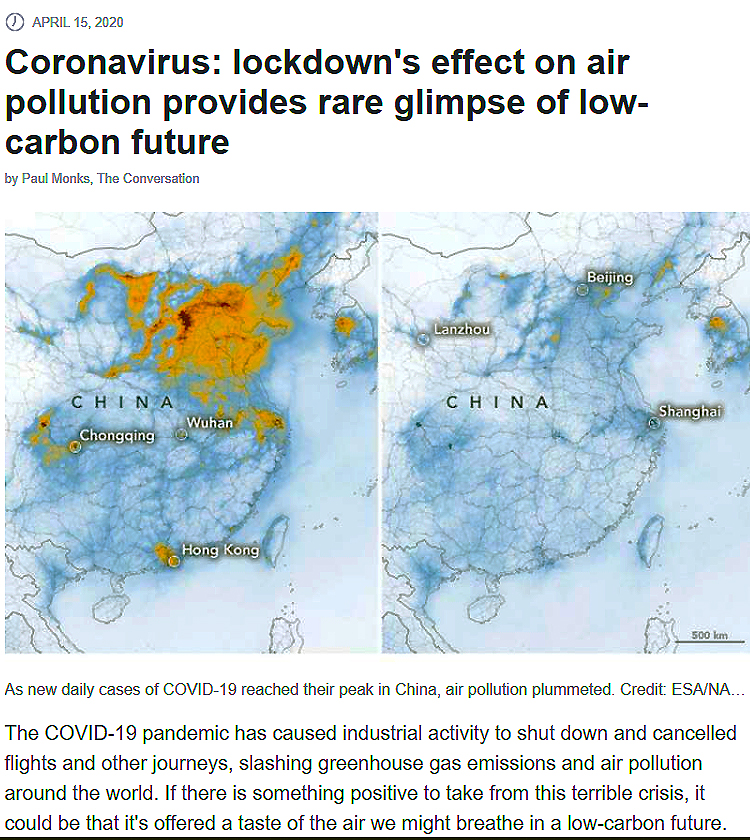EDITORIAL – Coronavirus, and its Earth (Day) Link
This is the time to consider the linkage between global pandemics and our environment
Coronavirus disease 2019 (COVID-19) is spreading fast, with each day’s headlines rapidly eclipsed by the next.
Why are we fairly good at responding to some crises, yet really not very good at responding to other long term crisis (e.g. climate change)?
A number of psychologists consider the question, while author and climate-activist Bill McKibben asks what can the coronavirus teach us?
The world health data, backed up by scientific studies, has observed that airborne fossil fuel pollution cause nearly 8.8 million deaths each year (globally).
The twin global threats of public health consequences linked to climate and air pollution impacts demonstrate how some communities are far more vulnerable to coronavirus disease than others; thanks to their proximity to pollution sources coupled to the consequences of global warming. Added into this complex societal impact mix is unequal access to healthcare, work flexibility, and basic infrastructure necessary for environmental sustainability and protections.
Altogether, air and water pollution produce public health costs and consequences for society that far greater than any single pandemic event.
The economic consequences of global warming, projected in the trillions of dollars in losses and added costs to the economy, and coupled to just a 2 degree rise in global temperatures — a human-driven cause and effect, primarily resulting from fossil fuel extraction, production, and the global burning this dirty form of energy.
The link among human-caused global warming, species loss, and the increase spread of more virulent diseases
Air pollution (globally), is primarily fueled by coal, oil, gas-fueled power plants and transportation emissions. Altogether, they directly accounts for millions of deaths annually – while the CORVID-19 pandemic has so far been attributed to an excess of 158,000 in virus-related deaths worldwide (4-18-20).
Coronavirus patients in areas that had high levels of air pollution before the pandemic are more likely to die from the infection than patients in cleaner parts of the country, according to a new nationwide study that offers the first clear link between long-term exposure to pollution and COVID-19 death rates.
In an analysis of 3,080 counties in the United States, researchers at the Harvard University T.H. Chan School of Public Health found high levels of tiny, airborne particles (known as PM 2.5) serving as carriers for the COVID-19 virus, and which were associated with areas with higher cornoavirus death rates — the same size as air pollution particulate matter from diesel emissions.
For weeks, public health officials have surmised a link between dirty air and death or serious illness from Covid-19.
The Harvard analysis is the first nationwide study to show a statistical link, revealing a “large overlap” between Covid-19 deaths and other diseases associated with long-term exposure to fine particulate matter.
“The results of this paper suggest that long-term exposure to air pollution increases vulnerability to experiencing the most severe Covid-19 outcomes,” the Harvard authors wrote.
Yes, COVID-19 is a global pandemic, but not global extinction
which is exactly what humans have been engaged in for the past 150 years in extracting and burning fossil fuels on a global scale…
Humans have been engaged in deficit spending of the world’s environmental assets and of the creatures we share those assets with and are being destroyed at an ever accelerating rate for the past 50 years. All this has, and is, happening without much public thought as to the consequences of this self-destructive path we’re on. In short, we humans have been acting like there is no tomorrow — well, tomorrow has arrived.
Environmental threats come in all shapes and sizes and most are human-caused and preventable.
As the marco dominant species on the planet, now threatened by a microscopic virus, all this begs one simple question: shouldn’t we humans re-examine the current planetary trajectory we’ve created by burning fossil fuels, and the effect on planet’s biosphere on which we all depend?
Most experts believed that once the crisis was over, the nation and its economy would revive quickly. But there would be no escaping a period of intense social and economic pain.
Even as the black plague ravaged Europe and its population during the 14th century, it produced an unlikely outcome, the Renaissance, a fervent period of European cultural, artistic, political and economic “rebirth” following a dark period of the Middle Ages.
COVID-19 is the deadly period we have all now entered. Governments and the world banking system are scrambling to respond. Instead, of just throwing money at the crisis, we could be re-prioritizing the world financial system. A change that can enable not only rapid economic recovery, but can be guided to enable a global transition to a clean-energy world economy.
What we need now is new clean energy Renaissance which will produce many more good paying jobs than it will displace, and can be based on proven technological opportunities available today; low-cost, renewable and emissions-free energy sources to power a newly reborn and fully electrified global economy — a transition already underway; but presently at only a fraction of its global replacement potential.
Such a transition would yield social and economic benefits, and in a short amount of time, eliminate those nearly 9 million preventable deaths annually attributed to air pollution.
The economic shift to clean energy efficiency and sustainability could also effectively address the most serious threat our world faces today, global warming (climate change).
Now is a time opportunity and can be period enlightened solutions which build bridges, not walls, for the stewards of this planet we call Earth. But, we must do this with the same urgency, energy, and resources of global response we are now witnessing as governments and economies address a single pandemic. Business as usual is no longer an option for humankind.
Exactly how the pandemic will end depends in part on medical advances still to come. It will also depend on how individual Americans behave in the interim. If we scrupulously protect ourselves and our loved ones, more of us will live. If we underestimate the virus, it will find us.
COVID-19 is a wake-up call for all humanity, and we can take this moment to reflect, consider, act by either starting to live in balance with our planet and ourselves – or – stay on our current business-as-usual path of biosphere destruction and eventually go extinct.



Leave a Reply
Join the Community discussion now - your email address will not be published, remains secure and confidential. Mahalo.